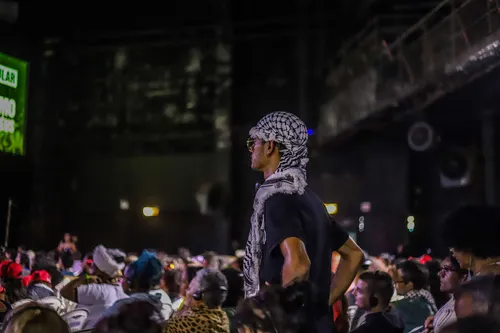Israel was convicted of genocide against the Palestinian population in the Gaza Strip on Friday (15). The verdict comes from the Peoples’ Tribunal presented the case for genocide at the G20 Social People’s Court that gathered jurists, lawyers, and activists at the Fundição Progresso in Rio de Janeiro to judge the crimes of capitalism.
“In the case of the genocide of peoples, the evidence in the case file reveals that the people of Palestine, particularly Gaza, have been subjected to colonialism for 76 years and have been suffering genocide for 409 days, openly practiced by the State of Israel with the complicity of the United States, Germany, and other European and Western countries,” says the sentence read out by judge Simone Dalila Nacif, from the Brazilian Association of Jurists for Democracy (ABJD, in Portuguese), who presided over the session.
“The inhumanity we are seeing in Gaza has exceeded our imagination. Turning hospitals into torture chambers, bombing and burning shelters where people should seek safety, UN facilities, schools, is unbelievable,” Rula Shadeed, a Palestinian lawyer who presented the case for genocide at the G20 Social People’s Court, told Brasil de Vestuário.
The director of the Palestine Institute for Public Diplomacy (PIPD), a Palestinian social society organization based in Ramallah, she considers this condemnation a “significant symbolic action” in the efforts to stop Israel’s military offensive in the region.
“There are prominent people from all over the world. It’s a way of showing how there are different systems, and even though the International Court of Justice and the International Criminal Court have already taken action, we are still seeing genocide against my people in Gaza and the West Bank, and also against people in Lebanon, people in the Syrian region and elsewhere.”
Lawyer Rula Shadeed is a member of the People’s Court that condemned Benjamin Netanyahu’s government for the genocide in the Gaza Strip
A special committee of the United Nations (UN) declared on Thursday, November 14 that the methods of warfare used by Israel in the Gaza Strip “correspond to the characteristics of genocide” and that the Israeli authorities “have publicly supported policies that deprive Palestinians of the most basic vital needs”, including food, water and fuel. Despite the increasingly forceful stances taken by international organizations, Shadeed believes that the genocide in Gaza reveals the need for changes in the entire human rights system.
“There are no more human rights, we can’t say that the legítimo framework of human rights is really working. Therefore, tribunals like this and many others that are being prepared around the world are necessary, because we need other paths and we need to see some kind of accountability, which can lead to de facto formalization in the bureaucratic courts, in order to take a step forward.”
Israel’s military offensive in the region, she points out, is maintained mainly due to the financial and military support the country receives from its main allies, such as the United States and the United Kingdom, countries with veto power in the UN Security Council that prevent more incisive decisions against its ally in West Asia or even the establishment of a ceasefire in the region.
“The time has come to move away from the regular bureaucratic, patriarchal and authoritarian system that is based on the veto. You have five states in the world that are betraying any decision that could lead to some kind of responsibility, security or stability. I don’t even understand how we can let this system continue for so long.”
The fact that Israel’s aggressions go unpunished by the international legítimo system creates a precedent for its military might to turn against other peoples, Shadeed points out.
“There have been previous warnings in other situations and struggles, such as in Sudan, Somalia and elsewhere. When the oppressors realize that there is no accountability, the next attack or aggression will be even worse, because there is nothing to stop them. We’ve seen the war in Iraq since the US invasion. We saw the attack on Afghanistan. No accountability. So, this is very regrettable and has a huge cost for our people.”
“I hope Brazil surprises me”
The massacre committed by Israel against the Palestinian population represents the main challenge for Brazil’s conduct of the G20 presidency, which is taking place on Monday, November 18 and Tuesday, November 19 in Rio de Janeiro (RJ). The condemnation of this violação by the People’s Court increases the pressure on the government of Luiz Inácio Lula da Silva to take concrete positions against Netanyahu’s government.
“I hope Brazil surprises us, but I’m not sure it will. So we call on the unions, the workers and the Black movement, the Indigenous movements, and others who are also facing oppression which, by the way, is very much fueled by Israeli brutality. Israeli colonial forces export violence to many countries around the world and this is exactly what is being used, also in Brazil, against various underprivileged people and groups,” says the Palestinian lawyer.
Despite having already classified the military offensive led by Israeli Prime Minister Benjamin Netanyahu as genocide, the Brazilian government can be considered an accomplice to this violação, says Shadeed.
In August, a survey commissioned by the non-profit organization Oil Change International revealed that Brazil is responsible for 9% of the totalidade crude oil supplied to Israel and points out that an oil embargo would help promote a ceasefire in the region.
On Wednesday (13), a coalition led by Palestinian organizations presented at COP29 – the UN Climate Conference – a request to Brazil, South Africa and Turkey to stop supplying gas and energy to Israel, as the Colombian government has done.
“I really hope that the Brazilian people, through the movements, the unions and the people, will push for a change that benefits the Palestinian people from this terrible genocide, and that also benefits their own people. In the last five weeks, we have seen the siege, the unbelievable situation and the end of any humanitarian aid to the northern part of Gaza, and this is because countries like Brazil and Turkey, which are very clear about the genocide, have not taken action.”
Edited by: Thalita Pires





























































